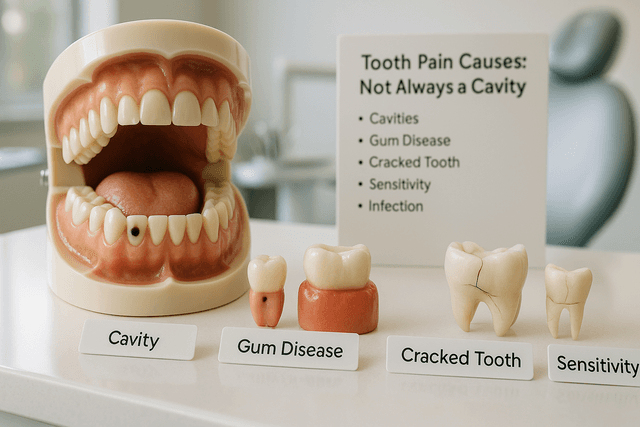General Dentistry
What Does Cavity Taste Like? Metallic, Sour, or Just Gross?
Cavities are more than just a dental inconvenience, they can actually leave a strange taste in your mouth before any visible damage appears. While most people associate cavities with pain, early signs often show up in subtler ways, including changes in taste and breath. Knowing what to look for can help you catch the problem before it gets worse
4 min read
Aug 04, 2025

Nobody wakes up craving a cavity. But what if your mouth is trying to warn you that one is sneaking in? Believe it or not, a cavity can have a taste, and once you notice it, chances are it’s been hanging out in your tooth for longer than you’d like. Catching the early signs of a cavity is key if you want to avoid more serious problems like advanced tooth decay, a root canal, or even tooth extraction.
So, what does a cavity taste like? And how can you tell if that odd taste in your mouth is something to worry about? Let’s break it down.
Cavity Clues and the Taste That Comes With Decay
When a cavity starts to form, it doesn’t usually shout. It whispers. One of the first whispers? A weird, bitter, or even slightly metallic taste in your mouth. This bad taste in your mouth isn’t from that new toothpaste or the questionable leftovers you microwaved. It’s the result of bacteria in your mouth breaking down food and enamel, causing decay. That process can leave behind a persistent bad taste, and yes, even an unpleasant smell or taste.
If you’ve ever noticed a foul taste when you wake up or after eating sugary foods, it could be a sign of an early cavity. As the decay worsens, it may begin to produce a stronger odor and taste. That’s your cue to take action.
Tooth Decay Can Cause Bad Breath and a Foul Taste
Bad breath may seem like a minor annoyance, but it’s often a flashing red light for poor oral hygiene or something more serious like a cavity. As tooth decay progresses, bacteria build up inside the affected tooth, producing sulfur compounds that cause bad breath. You may not notice it right away, but others might, which is definitely not ideal for your next date or office meeting.
And here’s the kicker: if your bad breath sticks around even after you brush and floss, it could be the result of the decay hiding inside a damaged tooth. When left untreated, the bacteria keeps growing, creating a persistent bad taste and leading to gum disease, tooth sensitivity, or even tooth loss.
Early Signs of a Cavity That You Shouldn’t Ignore
Cavities don’t always hurt, at first. That’s why spotting the signs of a cavity early on can save you from major dental drama. Here’s what to watch (and taste) for:
A chalky spot on your tooth that looks dull or white
A brown or black stain that won’t brush off
Mild tooth sensitivity to hot, cold, or sweet foods and drinks
A sour or foul taste in your mouth
A slight pain when biting or chewing
A visible hole in the tooth
Cavities are one of the most common dental issues, and while they start small, they don’t stay that way for long. The moment the decay reaches the dentin, the softer layer beneath your enamel, you’ll feel it. That’s when it’s time to see a dentist before things escalate.
The Role of Dental Hygiene and Preventing Cavities Early
We all know we’re supposed to brush and floss daily. But life gets busy, and before you know it, you’ve skipped a night or three. The problem? Plaque doesn’t take nights off. It forms quickly and begins to eat away at your tooth enamel, setting the stage for cavities to develop.
Regular brushing and flossing your teeth helps prevent plaque buildup and protect the enamel. Toss in a fluoride rinse, avoid sugary foods, and stay hydrated to prevent dry mouth, a common cause of decay. And don’t skip your checkup. Your dental office can spot tiny cavities before they turn into big problems.
What a Cavity Can Cause When Left Untreated
A cavity can cause a lot more than just a bad taste. If left untreated, that once-small spot can turn into a large cavity that destroys your tooth structure. Eventually, it can reach the root of your tooth, leading to intense pain, infection, and the need for a root canal treatment or tooth extraction.
Plus, if the decay is severe enough, the only fix might be a cavity filling or even a full crown. And trust us, while modern dentistry is pretty amazing, nobody wants to be in that chair longer than necessary.
When You May Need a Filling or More Serious Dental Care
If you're experiencing a persistent bad taste or noticing spots on your teeth, it's likely time for a filling. Modern dental care makes this process quick, relatively painless, and extremely effective. A cavity filling stops further decay and restores your tooth’s structure and function.
But the longer you wait, the higher the chances of needing more intensive treatments. A root canal isn’t the end of the world, but it’s definitely not how you want to spend your afternoon.
Why Cavities Don’t Always Hurt and What That Means
Cavities don’t always come with pain. In fact, one cavity may sneak in quietly and only become obvious when you notice a persistent bad taste, smell or taste something odd, or spot discoloration.
That’s why it’s crucial to learn more about how cavities form and take action before symptoms get worse. Your oral health depends on catching these things early and sticking to your dental routines.
Preventing Cavities Early and Keeping Your Smile Bright
At the end of the day, preventing cavities is way easier (and cheaper) than fixing them. Stay consistent with your oral hygiene, limit sugary treats, and make friends with your dentist. Regular cleanings, early intervention, and smart habits can keep your teeth in top shape, and your mouth free from that weird, bitter taste no one wants to talk about.
What Does a Cavity Taste Like?
A cavity can create a bitter, sour, or metallic taste in your mouth. This happens because bacteria break down food and enamel, releasing byproducts that affect taste and odor. If you notice a persistent bad taste that brushing doesn’t fix, it could be an early sign of tooth decay.
Can Tooth Decay Cause Bad Breath?
Yes, tooth decay often leads to bad breath. As bacteria build up inside a cavity, they release sulfur compounds that smell unpleasant and linger. If your breath smells bad even after brushing and flossing, a cavity or infection could be the cause.
What Are the Early Signs of a Cavity?
Early signs of a cavity include tooth sensitivity, visible white or brown spots, slight pain when chewing, or a strange taste in your mouth. Cavities may not cause pain right away, so noticing taste changes or discoloration can help you catch them early.
How Can I Prevent Cavities From Developing?
Preventing cavities starts with daily brushing, flossing, and regular dental checkups. Avoid sugary snacks, use fluoride toothpaste, and stay hydrated to reduce harmful bacteria. Early detection and good habits are key to keeping your teeth healthy and cavity-free.
Read Next
Related Posts

General Dentistry
Is Tooth Pain Always a Cavity or Could It Be Something Else?
Tooth pain can strike at the most inconvenient times, leaving you wondering what’s behind that sudden ache or sharp twinge. While cavities are a common culprit, they’re not the only reason your teeth might be hurting. Understanding the different causes of tooth pain can help you take the right steps toward relief and better oral health.
4 min read
Aug 25, 2025

General Dentistry
Dental Terminology for Front Desk: Boost Accuracy and Professionalism
Working the front desk at a dental office means juggling patients, appointments, and insurance details, all while staying calm and professional. One of the most powerful tools in your toolkit? A solid understanding of dental terminology. Knowing the right terms not only boosts your confidence but also improves communication and accuracy across the entire practice.
8 min read
Aug 24, 2025

General Dentistry
How Much Is a Dental Check-Up and What’s Included?
Regular dental visits are about more than keeping your smile bright, they’re essential for preventing serious oral health issues and saving money on future treatments. Understanding what’s included in a dental check-up and how much it costs can help you plan better and make informed decisions about your care.
5 min read
Aug 13, 2025
Don’t have time to research every dentist around you?
See why 30k+ patients trusted us